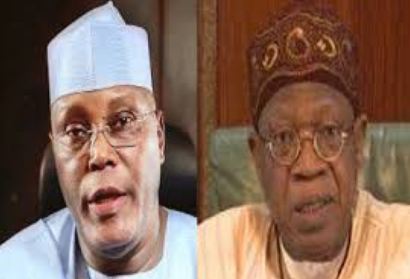Politics
FG Replies Atiku, Says He’s Spreading Lies About Nigeria’s Debt Profile
FG says Nigeria’s debt profile is justified and targeted at specific developmental projects

The federal government of Nigeria has cautioned former Vice President Atiku Abubakar to stop spreading lies about the country’s debt profile.
It will be recalled as published by Naija News on Tuesday that Atiku had raised an alarm about Nigeria’s rising debt profile and the continued borrowing by the federal government.
He lamented that if the country continues on the current trajectory, it may not be able to meet its debt obligations again in the nearest future.
However, the Minister of Information and Culture, Alhaji Lai Mohammed in a statement on Wednesday, questioned the authenticity of figures quoted by the former Vice President in his Tuesday article.
The Minister also clarified that borrowings by the current administration are targeted at infrastructural developments and not for greed as suggested by Atiku.
“There is no doubt that former Vice President Atiku Abubakar loves our country and wishes it well, otherwise he would not have sustained his serial quest for the country’s highest position,” the minister said.
“One can only hope that his resort to the use of such words as ‘precipice’, ‘foreclosure’ and ‘economic ruin’ does not reflect anything but best wishes for the country at this time.
“We are also not able to ascertain the source of the first quarter figures of N943.12 billion for debt servicing and N950.56 billion for retained revenue, which he also quoted.”
Giving further clarifications, Mohammed explained that one of the reasons why figures for debt servicing is so high is because of the dropping revenues from oil which is a major stay of the Nation’s economy.
“One of the reasons why debt service to revenue is high is because revenue generation in Nigeria has been low, with over-dependence on the oil sector,” he said.
“This is corroborated by the fact that the ratio of Nigeria’s tax revenue to GDP is one of the lowest in the world at about 6%.”
He however noted that the borrowings are justified and within manageable and acceptable limits.
“We have said that in the face of massive infrastructural decay, no responsible government will sit by and do nothing,” he said.
“The loans for the educational sector will contribute to the development of our human capital while the loans for the agricultural sector will help the move to diversify the economy.”












